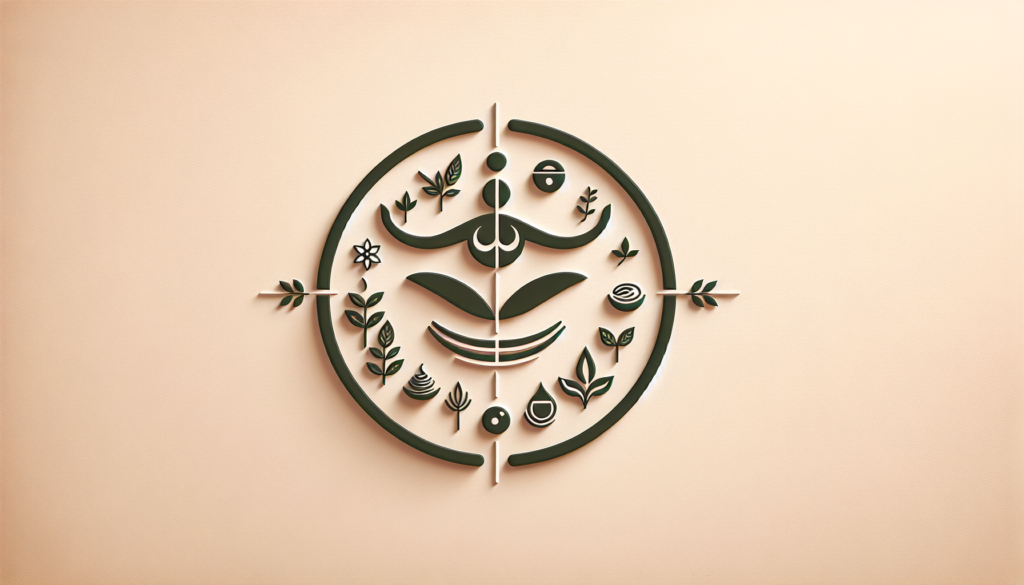Ayurveda, a traditional Indian system of medicine, has been practiced for thousands of years and is believed to promote holistic well-being. This ancient practice emphasizes the balance between mind, body, and spirit, with a focus on the natural healing power of herbs, diet, and lifestyle. Ayurvedic principles aim to restore and maintain harmony within the body to prevent and treat illnesses. By understanding your unique constitution, or dosha, Ayurveda offers personalized recommendations for health practices that can enhance your overall wellness. From dietary choices to specific yoga techniques, Ayurveda provides a comprehensive approach to improving your physical, mental, and emotional health.

Understanding Ayurveda
Origins of Ayurveda
Ayurveda, which translates to “science of life” in Sanskrit, is an ancient holistic healing system that originated in India over 5,000 years ago. It is considered one of the oldest medical systems in the world. Ayurveda is deeply rooted in the wisdom and practices of ancient Indian sages and has been passed down through generations.
Definition of Ayurveda
Ayurveda is a comprehensive system of medicine that emphasizes the balance of mind, body, and spirit to promote overall well-being. It views each individual as unique and seeks to understand their unique constitution, or prakriti, which is determined by a combination of three vital energies known as doshas – Vata, Pitta, and Kapha. Ayurveda aims to restore and maintain the balance of these doshas to achieve optimal health.
Principles of Ayurveda
The principles of Ayurveda revolve around the concept of maintaining balance and harmony within the body. It emphasizes the interconnectedness of the mind, body, and environment. Ayurveda focuses on the understanding that every individual has a unique constitution and that imbalances in the doshas can lead to physical and mental health issues. The main principles of Ayurveda include the holistic approach to health, individualized treatments, herbal medicine, diet and nutrition, yoga and meditation, and cleansing techniques.
Three Doshas of Ayurveda
Vata Dosha
Vata dosha is primarily composed of the air and space elements and is responsible for the movement and communication within the body. People with a dominant Vata dosha tend to be creative, energetic, and enthusiastic. However, when Vata is imbalanced, it can lead to anxiety, insomnia, and digestive issues. The key to balancing Vata dosha lies in establishing a routine, grounding oneself, and maintaining a warm and nourishing lifestyle.
Pitta Dosha
Pitta dosha is associated with the elements of fire and water and is responsible for transformation and metabolism within the body. Individuals with a dominant Pitta dosha tend to be ambitious, focused, and intense. However, an imbalance in Pitta can lead to anger, inflammation, and digestive disorders. The key to balancing Pitta lies in managing stress, maintaining a cool environment, and adopting a diet that keeps Pitta in check.
Kapha Dosha
Kapha dosha is primarily made up of the elements of earth and water and is responsible for structure, stability, and lubrication within the body. People with a dominant Kapha dosha are typically calm, nurturing, and supportive. However, an excess of Kapha can lead to weight gain, lethargy, and congestion. To balance Kapha dosha, it is essential to engage in regular physical activity, maintain a warm and stimulating environment, and consume light and warming foods.
Analyzing Health Practices
Holistic Approach to Health
One of the fundamental aspects of Ayurveda is its holistic approach to health. It recognizes that health is not simply the absence of disease but rather a state of complete physical, mental, and spiritual well-being. Ayurveda aims to identify the root causes of imbalances, rather than merely treating symptoms, by considering various factors such as diet, lifestyle, emotions, and environment.
Individualized Treatments
Ayurveda recognizes that each individual is unique and therefore requires personalized treatments. This individualized approach is based on understanding the person’s unique constitution, or prakriti, and identifying imbalances in the doshas. Treatments may include lifestyle adjustments, dietary changes, herbal remedies, massages, yoga, and meditation practices tailored to the individual’s specific needs.
Herbal Medicine
Herbal medicine plays a significant role in Ayurvedic treatments. Ayurveda utilizes various herbs and plants to restore balance to the body, mind, and spirit. These herbs are carefully selected based on their specific properties and effects on the doshas. From calming herbs like ashwagandha to digestive herbs like ginger, Ayurvedic practitioners prescribe herbal remedies to address specific health concerns and support overall well-being.
Diet and Nutrition
Ayurveda places great emphasis on diet and nutrition as a means of maintaining optimal health. It recognizes that food is not only a source of nourishment but also a form of medicine. Ayurvedic dietary guidelines are tailored to individual constitutions and focus on incorporating the six tastes – sweet, sour, salty, bitter, pungent, and astringent – in a balanced manner. This approach ensures a well-rounded and nourishing diet that supports digestion, vitality, and overall health.
Yoga and Meditation
Yoga and meditation are integral components of Ayurvedic health practices. These practices help promote physical strength, flexibility, mental clarity, and emotional well-being. Yoga postures, or asanas, are specifically designed to balance the doshas and promote the flow of prana (life force energy) throughout the body. Meditation, on the other hand, helps quiet the mind, reduce stress, and cultivate mindfulness.
Cleansing Techniques
Ayurveda recognizes the importance of cleansing and detoxification to remove accumulated toxins, or ama, from the body. Various cleansing techniques, collectively known as Panchakarma, are employed to eliminate toxins and restore balance. These techniques include oil massages, herbal enemas, nasal irrigation, and therapeutic vomiting. Cleansing techniques are believed to help prevent disease, improve digestion, and rejuvenate the body.
Benefits of Ayurveda
Promotes Overall Well-being
Ayurveda focuses on achieving balance and harmony within the body, which ultimately promotes overall well-being. By addressing the root causes of imbalances and restoring the natural state of the doshas, Ayurveda helps improve physical health, mental clarity, emotional stability, and spiritual connection.
Balances Body and Mind
One of the core principles of Ayurveda is the recognition of the inseparable connection between the body and mind. Ayurvedic practices aim to create harmony and balance between these two aspects of our being. When the body and mind are balanced, it results in improved energy levels, mental focus, emotional stability, and a greater sense of well-being.
Enhances Digestive Health
Ayurveda places great emphasis on proper digestion as the foundation of good health. It recognizes that a robust digestive system is essential for assimilating nutrients, eliminating waste, and maintaining the balance of the doshas. Ayurvedic principles of diet, nutrition, and herbal medicine work harmoniously to support and optimize digestive health.
Boosts Immune System
Ayurveda believes that a strong immune system is key to disease prevention and overall health. By supporting the balance of the doshas, optimizing digestion, and reducing stress, Ayurvedic practices help strengthen the body’s natural defense mechanisms. This, in turn, helps boost immunity and enhances the body’s ability to combat infections and diseases.
Reduces Stress and Anxiety
Stress and anxiety are prevalent issues in today’s fast-paced world. Ayurveda offers effective tools for managing and reducing stress. With its focus on creating balance, adopting a calming lifestyle, and practicing stress-reducing techniques such as yoga and meditation, Ayurveda provides a holistic approach to combatting stress and promoting emotional well-being.
Improves Sleep Quality
Quality sleep is crucial for overall health and well-being. Ayurveda recognizes the importance of proper sleep and offers guidance and practices to promote deep and restful sleep. By incorporating lifestyle adjustments, relaxation techniques, and nurturing bedtime rituals, Ayurvedic principles can help improve sleep patterns and enhance overall sleep quality.

Ayurvedic Treatments
Panchakarma Therapy
Panchakarma is a comprehensive detoxification and rejuvenation therapy utilized in Ayurveda. It involves a series of cleansing techniques, including oil massages, steam therapy, and herbal enemas, to eliminate toxins and restore balance in the body. Panchakarma therapy is believed to help prevent diseases, improve digestion, boost energy levels, and promote overall well-being.
Abhyanga (Ayurvedic Massage)
Abhyanga is a form of Ayurvedic massage that involves the application of warm herbal oils to the entire body. This therapeutic massage helps nourish the tissues, improve circulation, stimulate the lymphatic system, and promote relaxation. Abhyanga is known for its rejuvenating effects on the body and mind and is often incorporated as part of a self-care routine in Ayurveda.
Shirodhara (Oil Pouring on Forehead)
Shirodhara is a deeply relaxing Ayurvedic therapy that involves gently pouring warm herbal oil over the forehead in a continuous stream. This soothing treatment helps calm the nervous system, reduce stress, promote mental clarity, and improve sleep quality. Shirodhara is especially beneficial for individuals experiencing anxiety, insomnia, and mental fatigue.
Swedana (Herbal Steam Therapy)
Swedana, or herbal steam therapy, involves the application of herbal steam to the body to induce sweating and promote detoxification. It helps open the pores, relax muscles, improve circulation, and eliminate toxins. Swedana is often combined with other Ayurvedic treatments to enhance their efficacy and is an important part of the Panchakarma detoxification process.
Nasya (Nasal Administration)
Nasya is an Ayurvedic therapy that involves the administration of herbal oils or powders through the nasal passages. It helps lubricate the nasal passages, clear congestion, improve breathing, and nourish the tissues of the head and neck. Nasya is commonly used for sinus congestion, allergies, headaches, and to support overall respiratory health.
Netra Tarpana (Eye Rejuvenation)
Netra Tarpana is an Ayurvedic treatment specifically designed to nourish and rejuvenate the eyes. It involves the gentle pouring of warm medicated ghee into a dam created around the eyes using dough. This therapy helps relieve eye strain, dryness, and fatigue, and promotes overall eye health. Netra Tarpana is often used to address common eye conditions and is beneficial for individuals who spend long hours in front of screens.
Ayurveda in Daily Life
Ayurvedic Daily Routine (Dinacharya)
Ayurveda places great importance on daily self-care routines, known as Dinacharya, to maintain balance and well-being. Dinacharya includes various practices to align with the natural rhythms of the day, such as waking up early, performing tongue scraping and oil pulling, practicing yoga and meditation, following a nourishing diet, and going to bed at a reasonable hour. Following a consistent daily routine helps create stability, harmony, and optimal health.
Tips for Ayurvedic Self-Care
Incorporating Ayurvedic self-care practices into daily life can greatly enhance overall well-being. Some practical tips include eating mindfully and in a calm environment, engaging in regular physical activity, practicing relaxation techniques, getting enough restful sleep, and maintaining a positive and loving mindset. By prioritizing self-care, individuals can support their physical, mental, and emotional health and improve their quality of life.
Ayurvedic Rituals for Well-being
Ayurveda recognizes the value of rituals in promoting well-being. These rituals help create a sense of sacredness and mindfulness in everyday life. Some Ayurvedic rituals include daily oil massages, gratitude rituals, herbal baths, journaling, and spiritual practices. These rituals can be tailored to individual preferences and can be deeply nourishing and rejuvenating.
Incorporating Ayurvedic Principles
Incorporating Ayurvedic principles into daily life need not be overwhelming or complicated. Simple changes, such as choosing appropriate foods for your dosha, practicing mindful eating, using herbal remedies, and adopting relaxation techniques, can have a profound impact on health and well-being. By gradually incorporating Ayurvedic principles, individuals can experience the benefits of this ancient wisdom in their daily lives.

Ayurveda and Diseases
Prevention and Management
Ayurveda places great emphasis on prevention as the key to maintaining good health. By identifying and addressing imbalances in the doshas, Ayurveda seeks to prevent diseases before they manifest. This prevention-focused approach includes lifestyle adjustments, dietary modifications, herbal remedies, stress management, and regular detoxification practices.
Common Ayurvedic Remedies
Ayurveda offers a wide range of herbal remedies to address common health concerns. From herbal formulations to single herbs, Ayurvedic remedies are well-known for their natural healing properties. For example, ashwagandha is commonly used for stress management, triphala for digestion, and Brahmi for cognitive health. Ayurvedic remedies are typically prescribed based on individual constitution and specific health needs.
Specific Approach for Different Diseases
Ayurveda recognizes that different diseases require different treatment approaches. Ayurvedic practitioners take into account the specific imbalances in the doshas and design treatment protocols accordingly. For example, digestive disorders may require dietary modifications and specific herbs, whereas autoimmune conditions may require immune-boosting herbs and stress reduction techniques. By tailoring treatments to individual needs, Ayurveda offers a unique approach to disease management.
Ayurveda for Mental Health
Ayurvedic Perspective on Mental Health
Ayurveda recognizes the intricate connection between the mind and body and understands that mental health plays a vital role in overall well-being. According to Ayurveda, imbalances in the doshas can affect mental health by influencing the mind’s qualities, such as clarity, calmness, and creativity. Ayurveda aims to restore balance in the doshas and promote mental well-being through a combination of lifestyle changes, herbs, and mind-calming practices.
Balancing Psychological Imbalances
Ayurveda offers a holistic approach to balancing psychological imbalances. This approach includes identifying and addressing the root causes of mental disturbances, enhancing digestion and detoxification to eliminate toxins that affect mental clarity, incorporating stress-reducing practices like yoga and meditation, and using specific herbs and herbal formulations to support mental well-being. By addressing both physical and mental aspects, Ayurveda aims to restore balance and promote emotional harmony.
Herbs and Lifestyle for Mental Well-being
Ayurveda utilizes various herbs and lifestyle practices to support mental well-being. Ashwagandha, known as an adaptogen, helps combat stress and anxiety, while Brahmi supports cognitive function and promotes mental clarity. Additionally, Ayurvedic lifestyle practices such as following a regular routine, maintaining a nurturing environment, practicing self-care, and engaging in mind-calming activities like meditation can significantly contribute to mental well-being.

Ayurveda and Modern Medicine
Integration with Modern Healthcare
Ayurveda can be integrated with modern healthcare to provide a complementary approach to wellness. While modern medicine focuses on diagnosing and treating acute diseases, Ayurveda offers a holistic perspective and focuses on prevention, lifestyle modifications, and maintaining overall well-being. Integrating Ayurvedic practices, such as herbal remedies, nutrition, and stress reduction techniques, with conventional medical treatments can enhance the effectiveness of modern healthcare.
Complementing Conventional Treatments
Ayurveda can work alongside conventional medical treatments to provide a more comprehensive approach to healing. For instance, Ayurvedic herbal remedies can support the body during chemotherapy, yoga and meditation practices can help manage chronic pain, and Ayurvedic lifestyle recommendations can improve overall quality of life in conjunction with modern treatments. By integrating the strengths of both systems, individuals can experience the benefits of a holistic approach to health.
Potential Challenges and Considerations
As with any medical system, there are potential challenges and considerations when incorporating Ayurveda into modern healthcare. One challenge is the lack of standardized regulations and licensing for Ayurvedic practitioners, which may make it difficult to find reputable practitioners. Additionally, individual responses to Ayurvedic treatments may vary, and it is essential to consult with qualified practitioners and inform your primary healthcare provider about any Ayurvedic treatments you are considering.
Choosing an Ayurvedic Practitioner
Qualifications and Training
When seeking an Ayurvedic practitioner, it is essential to consider their qualifications and training. Look for practitioners who have completed formal education and training programs in Ayurveda from reputable institutions. These programs typically involve in-depth study of Ayurvedic principles, diagnosis, herbal medicine, and practical experience. Certification from recognized Ayurvedic governing bodies can also provide reassurance of the practitioner’s knowledge and expertise.
Finding a Reputable Practitioner
To find a reputable Ayurvedic practitioner, consider seeking recommendations from trusted sources, such as friends, family, or healthcare providers who have experience with Ayurveda. Take the time to research the practitioner’s background, read reviews or testimonials, and inquire about their training, certifications, and years of experience. A reputable Ayurvedic practitioner understands the importance of individualized treatments, takes the time to listen, and respects each person’s unique needs.
Consultation and Treatment Process
During a consultation with an Ayurvedic practitioner, expect a thorough assessment of your health history, lifestyle, diet, and mental and emotional well-being. The practitioner will then determine your unique constitution and imbalances in the doshas. Based on this assessment, they will develop a personalized treatment plan, which may include dietary recommendations, herbal remedies, lifestyle adjustments, and therapeutic practices such as massages or yoga. Regular follow-up sessions will help monitor progress and adjust the treatment plan as needed.
In conclusion, Ayurveda is an ancient holistic healing system that offers a comprehensive approach to promoting optimal health and well-being. By understanding the origins, principles, and doshas of Ayurveda, one can delve into the various health practices, treatments, benefits, and daily life rituals associated with this ancient science. Ayurvedic principles, when integrated with modern medicine, offer a complementary approach to wellness, and finding a reputable Ayurvedic practitioner can help guide individuals on their journey towards balanced health. With its focus on harmonizing the mind, body, and soul, Ayurveda provides a gentle and friendly path towards achieving and maintaining overall well-being.



